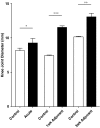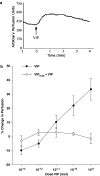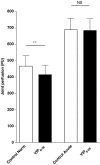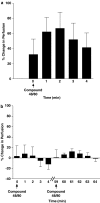The role of joint nerves and mast cells in the alteration of vasoactive intestinal peptide (VIP) sensitivity during inflammation progression in rats
- PMID: 15723091
- PMCID: PMC1576122
- DOI: 10.1038/sj.bjp.0706169
The role of joint nerves and mast cells in the alteration of vasoactive intestinal peptide (VIP) sensitivity during inflammation progression in rats
Abstract
The present study examined the peripheral effects of vasoactive intestinal peptide (VIP) on rat knee joint blood flow during acute and chronic inflammation. The involvement of joint nerves and synovial mast cells on these effects was also investigated. Prior to blood flow assessment, animals were deeply anaesthetised with ethyl carbamate (urethane; 2 mg kg(-1) i.p.). Local application of VIP (10(-13)-10(-9) mol) onto the capsular surface of normal rat knee joints caused a dose-dependent increase in synovial perfusion with an ED50 of 1.2 x 10(-11) mol. The dilator effect of the peptide was transient with the maximal response occurring approximately 1 min after drug administration. VIP-induced vasodilatation was blocked by co-administration of the VIP receptor antagonist VIP(6-28) (10(-9) mol). The inhibitory effect of the antagonist was consistent across the entire VIP dose range (P=0.01). The vasoresponsiveness to VIP was significantly attenuated in acutely inflamed joints; however, surgical denervation of acutely inflamed knees re-established the vasodilator effect of the neuropeptide. Topical application of VIP to 1- and 3-week adjuvant monoarthritic knees produced a hyperaemic response, which was not significantly different from normal (P=0.06 and 0.73 for 1- and 3-week adjuvant treated joints, respectively). Stabilisation of synovial mast cells by disodium cromoglycate (cromolyn) pretreatment did not alter the vasoresponsiveness to VIP in acute or chronically inflamed joints. The vasodilatatory effect of VIP is lost during acute knee joint inflammation and this abrogated effect is neurally dependent. In the chronic phase of knee joint inflammation, VIP-mediated hyperaemia recovers to normal levels. Synovial mast cells do not influence the vasomotor effects of exogenously applied VIP in inflamed knee joints.
Figures






References
-
- ABRAMOVICI A., DAIZADE I., YOSIPOVITCH Z., GIBSON S.J., POLAK J.M. The distribution of peptide-containing nerves in the synovia of the cat knee joint. Histol. Histopathol. 1991;6:469–476. - PubMed
-
- ACKERMANN P.W., LI J., FINN A., AHMED M., KREICBERGS A. Autonomic innervation of tendons, ligaments and joint capsules. A morphologic and quantitative study in the rat. J. Orthop. Res. 2001;19:372–378. - PubMed
-
- AHMED M., BJURHOLM A., SCHULTZBERG M., THEODORSSON E., KREICBERGS A. Increased levels of substance P and calcitonin gene-related peptide in rat adjuvant arthritis. A combined immunohistochemical and radioimmunoassay analysis. Arthritis Rheum. 1995a;38:699–709. - PubMed
-
- AHMED M., BJURHOLM A., SRINIVASAN G.R., LUNDBERG T., THEODORSSON E., SCHULTZBERG M., KREICBERGS A. Capsaicin effects on substance P and CGRP in rat adjuvant arthritis. Regul. Peptides. 1995b;55:85–102. - PubMed
-
- BARIN A.K., MCDOUGALL J.J. Endomorphin-1 causes synovial hypoaemia in rat knee joints via a capsaicin-sensitive neural pathway. Neurosci. Lett. 2003;344:21–24. - PubMed
Publication types
MeSH terms
Substances
LinkOut - more resources
Full Text Sources
Medical

